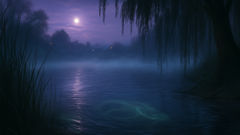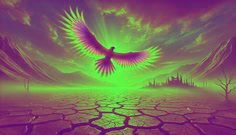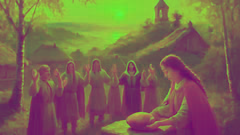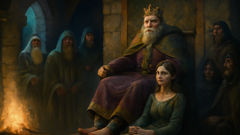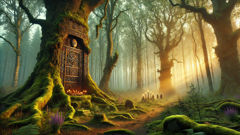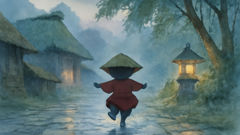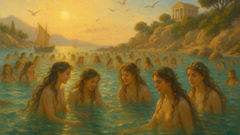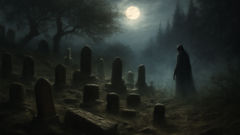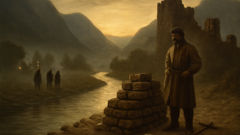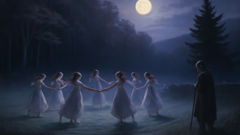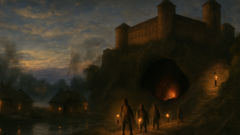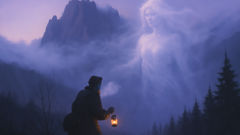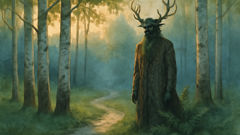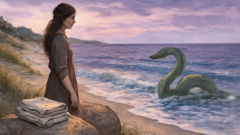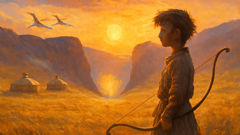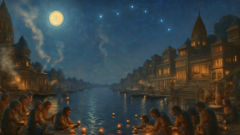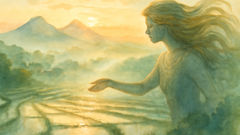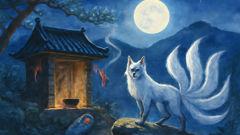Introduction
In the heart of old Russia, where the Volga River curves through endless forests and misty meadows, villagers lived and died by the water’s edge. The river was their lifeblood—fishermen cast their nets before dawn, children played along its muddy banks, and millers ground the village’s grain with wheels turned by its restless current. Yet, beneath the surface of these tranquil waters, something ancient and unpredictable waited. Generations whispered about the Vodyanoy, a water spirit whose moods were as changeable as the river itself. He was said to rule an underwater realm filled with sunken treasures, lost souls, and drowned memories. Some claimed they’d seen his green, algae-covered head break the water at twilight, his red, lidless eyes watching from the shadows. Others heard only stories—of disappearances, of sudden storms conjured from clear skies, of fishermen pulled beneath the surface by invisible hands. For those who called the Volga home, belief in the Vodyanoy was not superstition, but survival. Offerings of black bread and tobacco left on the banks at dusk were as routine as prayers, and every child grew up knowing that certain songs must never be sung near the water’s edge. In a world ruled by nature’s whims, the line between myth and reality blurred. The Vodyanoy was both a warning and a reminder: respect the river, or risk awakening the wrath of its lord.
Whispers by the Water: The Village and Its Fears
The village of Veshny, nestled among birch trees and fields of wild rye, was both blessed and cursed by its proximity to the Volga. To outsiders, it was a place of simple beauty—a cluster of wooden cottages with smoke curling from their chimneys, gardens bursting with cabbages and dill, and the constant song of water flowing past. But for those who belonged, Veshny’s true rhythm pulsed with a deeper awareness: every action, every celebration, every sorrow was tied to the river. At dawn, women in kerchiefs swept their doorsteps and murmured blessings for the fishermen heading to their boats. At noon, children dared each other to race to the water’s edge, but none lingered too long. And at dusk, as the sun slipped behind the forest, the entire village seemed to pause, as if waiting for permission from something unseen before lighting their lamps and shutting their shutters.
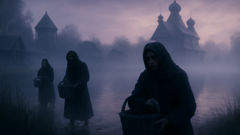
The Vodyanoy’s presence was everywhere—woven into lullabies, carved into talismans hung above cradles, painted in ochre on the ancient stones by the shore. His legends dated back centuries. Old Yefim, the village storyteller, would gather children around the fire in winter and speak of the water spirit’s kingdom: a palace of twisted roots and river stones, with halls of silt and treasure plundered from drowned boats. The Vodyanoy himself, Yefim claimed, was monstrous and regal—his beard tangled with pondweed, his fingers webbed, his laughter bubbling up from beneath the ice each spring.
Yet it was not just tales that kept fear alive. Every year, at least one soul vanished. Sometimes it was a fisherman, pulled under during a sudden squall; sometimes a washerwoman who strayed too deep into the reeds. Their families would grieve quietly, for to mourn too loudly was to risk attracting the Vodyanoy’s notice. Instead, they left offerings—coins, scraps of cloth, a crust of bread—hoping to appease the spirit and prevent more loss. Even the bravest men crossed themselves before approaching the river at night.
Not all villagers believed the spirit was evil. Some said he was simply capricious—a guardian of his realm who demanded respect, not malice. Those who honored him could sometimes find favor: a fisherman whose nets overflowed after leaving a pipe of tobacco on a flat stone; a child rescued from drowning by a mysterious hand; a drought broken by a sudden, gentle rain. But woe to those who mocked or challenged him. The river would rise, swallowing fields and homes without warning, or run dry for weeks, starving crops and cattle. For Veshny, the river’s gifts and punishments were inseparable from the spirit who ruled it.
The Miller’s Son: A Bargain with the Deep
Pyotr was born on a rainy autumn night, the son of the village miller and his wife, whose laughter had faded after losing their first child to the river. From the start, Pyotr was drawn to water—he spent hours watching the river’s shifting surface, collecting smooth stones and listening to the songs it sang beneath the mill wheel. As he grew, his father tried to teach him caution, but Pyotr was restless, too curious for his own good. He asked questions that made the elders frown: Why did the Vodyanoy take some and not others? What did he do with those he claimed? Could he ever be bargained with?
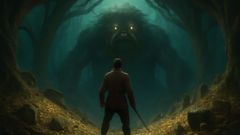
One spring, after a particularly harsh winter, the river ran high and wild, tearing loose branches from the banks and threatening to flood the mill. The villagers, desperate to save their grain, begged Pyotr’s father to work through the night. As the mill wheel groaned and the rain lashed the roof, Pyotr watched from a window, feeling a strange thrill in the storm’s fury. Suddenly, a flash of lightning illuminated something impossible—a figure rising from the water, twice as tall as a man, with eyes that glowed like embers and a crown of twisted roots atop his head.
The Vodyanoy had come.
Terrified yet fascinated, Pyotr crept down to the river’s edge. The spirit loomed above him, water streaming from his beard, webbed hands clutching a staff made of driftwood and bone. In a voice like rushing water, he spoke: "The river is hungry. Your people have forgotten their debts. Make an offering, or the flood will take what it will."
Pyotr, trembling, begged for mercy. The Vodyanoy’s gaze narrowed. "A bargain, then. Bring me what is most precious to you, and I will spare your village. Fail, and you will lose what you cannot bear to lose."
Desperate, Pyotr returned home. He found his mother’s locket—her last memory of his lost sister—and left it on the riverbank with a prayer. The floodwaters receded by morning, and the village was saved. But Pyotr was not free. Each night, the spirit haunted his dreams, whispering riddles and promises. The bargain was not complete. What was most precious, truly?
Unable to find peace, Pyotr visited Old Yefim. The storyteller listened, his face grave. "The Vodyanoy is never satisfied," Yefim warned. "He wants what we treasure—our hope, our courage, our love. If you wish to end this, you must meet him on his own ground."
So Pyotr prepared. He gathered tokens of his life—a carved whistle from childhood, a loaf of his mother’s bread, a handful of silver coins. At midnight, he waded into the river’s chill embrace, following the moon’s reflection deep beneath the surface. There, in a palace of shadows and rippling light, he found the Vodyanoy waiting.
"You have come," the spirit said, his voice softer but no less powerful. "Are you ready to pay the price?"
Pyotr nodded. "I offer myself. Let my courage be your tribute, if you will spare my family and my village forever."
For a long moment, the Vodyanoy was silent. Then he reached out, touching Pyotr’s brow with a hand cold as death. "Bravery is rare among mortals. You have given what is most precious. Your people will be safe—as long as they remember. Go now, and never forget who watches from the depths."
Pyotr awoke on the riverbank at dawn, the whistle clutched in his hand. The locket was gone, but so was the spirit’s presence. From that day forward, the floods ceased and no more villagers vanished. Pyotr grew into a wise man, respected by all, but he never again approached the river alone.
Ripples of Memory: The Vodyanoy’s Legacy
Years passed in Veshny, and the river seemed tamer somehow—its floods gentler, its waters clear even in spring. Villagers still left offerings out of habit, but fear gave way to respect. They taught their children the old songs, not as warnings but as history. And always, they honored Pyotr, who became both elder and mediator, trusted to interpret the river’s moods and guide the village through lean seasons and storms.
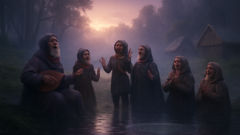
But the Vodyanoy had not vanished. Sometimes, in the hush before dawn, someone would glimpse a ripple with no wind to stir it, or see a flash of green beneath the surface where no fish swam. Fishermen spoke of finding their nets mended with strange silver thread, or discovering unexpected bounty after a night spent dreaming of voices from the deep. A few even claimed to have met the spirit—never in anger, but with a grave dignity that inspired both awe and humility.
It was during a long summer drought that the legend truly returned. Crops withered in their furrows, and even the oldest wells ran dry. Despair crept through Veshny like fog, and some began to whisper that the Vodyanoy’s favor had run its course. Pyotr, now grey-haired but strong, gathered the villagers by the river. He reminded them that gratitude must never be replaced by entitlement, that nature’s gifts were not owed but given.
That night, every family brought something to the water’s edge—not just bread or coins, but music and laughter. Children sang, mothers braided wildflowers into wreaths, fathers told stories by firelight. Pyotr himself played the whistle he’d carried from his dream—its song sweet and haunting, echoing across the water. As the first light of dawn painted the sky, a gentle rain began to fall, soaking the earth and refilling the river’s banks.
The drought was broken, and the villagers rejoiced. Yet Pyotr knew this was not merely chance. The Vodyanoy had been watching, weighing their hearts as much as their offerings. For the rest of his days, Pyotr taught that the river was both a mirror and a mystery—a force that demanded humility and reverence. Through him, Veshny learned to live in balance with the wild, never forgetting that in the depths lurked both danger and wonder.
The legend of the Vodyanoy became more than a story; it was woven into the fabric of life along the Volga. Each generation added its own thread—tales of mercy, warnings against pride, lessons in patience. And sometimes, on moonlit nights when mist curled above the water, a child would ask if the spirit was real. The answer was always the same: as real as the river itself, and just as worthy of respect.
Conclusion
The myth of the Vodyanoy endures because it speaks to something universal: the fragile pact between humanity and nature. For those who lived by the river’s edge in old Russia—and for all who listen to their stories today—the water spirit is more than a monster or a memory. He is a reminder that the world beneath the surface is vast and unknowable, that respect and gratitude are owed to forces beyond our understanding. Pyotr’s courage changed his village’s fate, but it was humility that secured their peace. The Vodyanoy’s tale invites us to look deeper, to question what we take for granted, and to honor the mysteries that shape our lives. Even now, when dusk falls and rivers run dark, who can say what ancient eyes might be watching from the depths?

